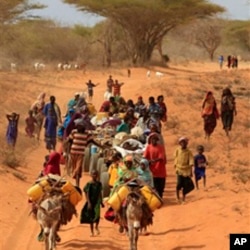A United Nations Refugee official says Islamist al-Shabab militants are preventing Somalis from fleeing to neighboring countries in search of assistance. The official was in Somalia Thursday to assess conditions in that famine-stricken country. In a telephone linkup from Nairobi to journalists in Geneva, the official says al-Shabab wants to keep people from leaving so they can be recruited as fighters.
Famine or no famine?
Several weeks ago, al-Shabab surprised the world by acknowledging the presence of famine in Somalia. The group followed its announcement by inviting humanitarian agencies to come to southern and central Somalia to distribute aid.
But, soon after, Al-Shabab reversed this policy. It denied there was famine and told the aid agencies to stay away. Bruno Geddo, UNHCR Representative for Somalia says discussions with people he met have clarified this puzzling change of mind.
“Al-Shabab realized that by letting people go, they would be deprived of a base for military recruitment," said Geddo. "They appear, according to the IDPs [internally displaced people] I interviewed yesterday, to have set up roadblocks, whereby only individuals can sneak out unnoticed. It is better during nighttime. But, groups are no longer allowed to move from areas under their control.”
Famine zones
Areas in central and southern Somalia are under the control of al-Shabab. The United Nations has declared five regions famine zones and says it is likely that famine will spread throughout the whole area in the next four to six weeks.
Speaking by telephone from Nairobi, Geddo tells VOA the famine, as terrible as it is, appears to be working in favor of the insurgents.
“The IDPs even said that because of the increase in the food prices, this has been a boon for Shabab’s recruitment campaign because when you do not have purchasing power to buy the food, you will be encouraged to be recruited because then you would be saved and you could use that salary or even you could be given food directly," said Geddo. "So, it looks like quite a reality and it is true that if your regions are emptied out, you are deprived of manpower.”
Displaced
The famine gripping Somalia is causing hundreds of thousands of desperate people to seek help wherever they can. The United Nations reports about one-quarter of Somalia’s 7.5 million people are either internally displaced or are living as refugees in neighboring Kenya and Ethiopia.
The United Nations reports accurate mortality numbers in Somalia remain elusive, but it estimates tens of thousands of people have died from malnutrition and disease between April and the end of June.
UNHCR Representative Geddo says most Somalis are reluctant to uproot themselves. He says they would prefer to stay home, if possible. Though conditions are extremely difficult, Geddo says many people he met told him they are staying put in the hopes they can plant a crop when the rainy season begins in October.





